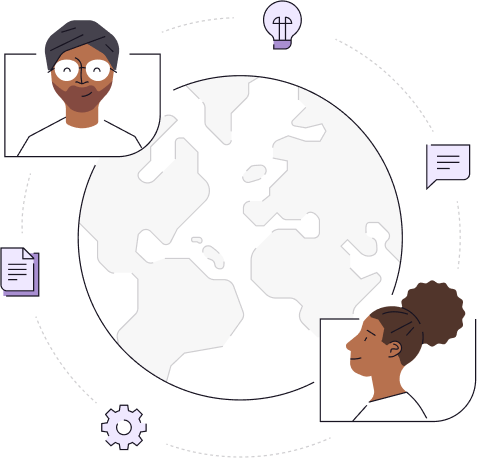
TeamOps: A Framework for Operating in the Future of Work
Navigating the challenges of our evolving work dynamics? TeamOps paves the way for streamlined decisions and seamless execution, fostering top-tier teams that make remarkable progress.
TeamOps is a performance-centric operational approach designed to optimize team dynamics, streamline decision-making, and enhance productivity within organizations.
Developed, practiced, and refined by GitLab, it's a framework grounded in actionable principles that transform how teams work and relate.
TeamOps resolves the common challenges teams encounter, such as...
- Decision making delays
- Meeting fatigue
- Internal miscommunication
- Slow handoffs and workflow delays
Built for all teams. Remote, Hybrid, or Office.
Built for all teams. Remote, Hybrid, or Office.

TeamOps is an organizational operating model that helps teams maximize productivity, flexibility, and autonomy by managing information more efficiently.
TeamOps helps organizations make greater progress, by optimizing knowledge management, decision making, and worker autonomy.
Proven in Practice
GitLab's historical success with TeamOps boosts productivity and team morale. Originated internally, we are confident in its transformative power for businesses globally.
Operational Outcomes
TeamOps is grounded in four Guiding Principles that can help organizations rationally navigate the dynamic, changing nature of work.
Strategies in Action
Every principle is supported by a set of Action Tenets – practical working methods ready for immediate action.
Real-World Examples
We bring the Action Tenets to life with a growing library of real output-based examples from GitLab and other TeamOps practitioners.
Learning Services
Get support in adopting TeamOps model from courses, workshops, certifications, assessments, consulting, and more.
Get immersed in TeamOps
The world has plenty of opinions on the future of work.
The TeamOps Course helps organizations make greater progress, by treating how your team members relate as a problem that can be operationalized.
In just a few hours, our free course will guide you through each of the Guiding Principles and Action Tenets of the model, and start to assess compatibility with your team’s current operating practices.
Guiding Principles of TeamOps
TeamOps facilitates effective collaboration through four phases of group alignment.
Shared reality
While other management philosophies prioritize the speed of knowledge transfer, TeamOps optimizes for the speed of knowledge retrieval.
Learn MoreEqual contributions
Organizations must create a system where everyone can consume information and contribute, regardless of level, function, or location.
Learn MoreJoin the movement
TeamOps is an organizational operating model that helps teams maximize productivity, flexibility, and autonomy by managing decisions, information, and tasks more efficiently.
Join a growing list of organizations who are practicing TeamOps.
Take GitLab for a spin
See what your team can do with a single platform for software delivery.
Get free trial

